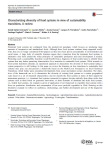Gaitán-Cremaschi D., Klerkx L., Duncan J., Trienekens J., Huenchuelo C., Dogliotti S., Contesse M.E., Rossing W.A.H. (2019). Characterizing diversity of food systems in view of sustainability transitions. A review. Agronomy for Sustainable Development, 01/02/2019, vol. 39, n. 1, p. 1-23.
https://doi.org/10.1007/s13593-018-0550-2
https://doi.org/10.1007/s13593-018-0550-2
| Titre : | Characterizing diversity of food systems in view of sustainability transitions. A review (2019) |
| Auteurs : | D. Gaitán-Cremaschi ; L. Klerkx ; J. Duncan ; J. Trienekens ; C. Huenchuelo ; S. Dogliotti ; M.E. Contesse ; W.A.H. Rossing |
| Type de document : | Article |
| Dans : | Agronomy for Sustainable Development (vol. 39, n. 1, 01/02/2019) |
| Article en page(s) : | p. 1-23 |
| Langues : | Anglais |
| Langues du résumé : | Anglais |
| Catégories : |
Thésaurus IAMM SYSTEME AGROALIMENTAIRE ; SYSTEME ALTERNATIF ; DEVELOPPEMENT DURABLE ; DIAGNOSTIC ; INNOVATION ; SYSTEME DE PRODUCTION ; CHAINE DE VALEUR ; AGROECOLOGIE ; REGIME ALIMENTAIRECatégories principales 10 - INDUSTRIES ; 10.2 - IAA (en général) |
| Résumé : | Dominant food systems are configured from the productivist paradigm, which focuses on producing large amounts of inexpensive and standardized foods. Although these food systems continue being supported worldwide, they are no longer considered fit-for-purpose as they have been proven unsustainable in environmental and social terms. A large body of scientific literature argues that a transition from the dominant food systems to alternative ones built around the wider principles of sustainable production and rural development is needed. Promoting such a sustainability transition would benefit from a diagnosis of food system types to identify those systems that may harbor promising characteristics for a transition to sustainable food systems. While research on food system transitions abounds, an operational approach to characterize the diversity of food systems taking a system perspective is still lacking. In this paper we review the literature on how transitions to sustainable food systems may play out and present a framework based on the Multi-Level Perspective on Socio-Technical Transitions, which builds upon conceptual developments from social and natural science disciplines. The objectives of the framework are to (i) characterize the diversity of existing food systems at a certain geographical scale based on a set of structural characteristics and (ii) classify the food systems in terms of their support by mainstream practices, i.e., dominant food systems connected to regimes; deviate radically from them, niche food systems such as those based on grassroots innovation; or share elements of dominant and niche food systems, i.e., hybrid food systems. An example is given of application of our framework to vegetable food systems with a focus on production, distribution, and consumption of low-or-no pesticide vegetables in Chile. Drawing on this illustrative example we reflect on usefulness, shortcomings, and further development and use of the diagnostic framework. |
| Cote : | En ligne |
| URL / DOI : | https://doi.org/10.1007/s13593-018-0550-2 |







